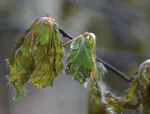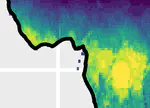Our research
Research in the GECO group takes place at the intersection of Earth system science, terrestrial ecology, biogeochemistry, hydrology, and data science and is carried out along the following lines:
Developing data-driven methods to detect and predict impacts of climate extremes and patterns of vegetation-atmosphere exchange of water and CO2.
In our research, we use large volumes of Earth Observation and ecosystem data and machine learning methods to (i) infer information about the properties of the Critical Zone in controlling land-atmosphere exchange and land-climate feedbacks with a particular focus on the sensitivity of vegetation to water stress, (ii) forecast impacts of extreme heat and drought events on forests and pastures. With our data-driven research, we provide information of climate impacts at scales that are relevant to diverse stakeholders, and inform open questions underpinning bias and divergence in global models.
Developing mechanistic models for robust simulations of terrestrial biosphere processes and their reposes to a changing environment.
Our development of mechanistic ecosystem and terrestrial carbon cycle models is focused (i) on the implementation of eco-evolutionary optimality principles for simulating acclimating and adapting vegetation responses to environmental change; (ii) on resolving heterogeneity of vegetation structure (age and height) and the landscape (topography and hydrology) for continental-to-global scale model simulations; and (iii) integrating diverse ecosystem and Earth observation data for model calibration and predictions. Particular research challenges we currently address include effects of climate change and rising CO2 on plant growth, stoichiometry and carbon allocation, and on forest structure and stand dynamics; and the impacts of droughts across heterogenous landscapes and vegetation types. With this research, we contribute to building a next generation of terrestrial biosphere models for simulating climate change effects and Earth system dynamics across a range of time scales (from the past to the future).







